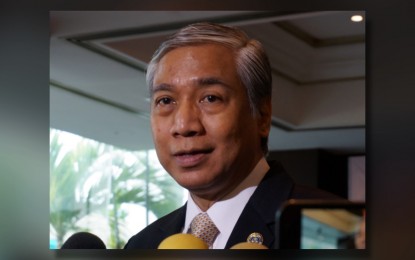
JAIL DECONGESTION SUMMIT. Department of Justice (DOJ) Undersecretary Jesse Andres in an interview with newsmen after his turn to present the DOJ position during Thursday's (Dec. 7, 2023) session of the Jail Decongestion Summit. Andres said a recent directive requiring closer cooperation between law enforcement officers and prosecutors to secure ironclad cases would not only result in sure convictions and weed out harassment cases but would also help address jail congestion. (PNA photo by Ben Pulta)
MANILA – A Department of Justice (DOJ) official said Thursday a recent directive requiring closer cooperation between law enforcement officers and prosecutors to secure ironclad cases would not only result in sure convictions and weed out harassment cases but would also help address jail congestion.
Speaking at the ongoing Jail Congestion Summit in Manila, DOJ Undersecretary Jesse Andres said the new policy under Department Circular 20, adopted by the department for the prosecution of offenses, would “keep in mind the interests of victims” of crimes.
Andres said the number of cases filed after the new policy has dropped by 20 percent.
The DOJ expects the number of filed cases to go further down by up to 50 percent when the program is fully cascaded throughout the country.
Andres noted that despite the lesser number of filed cases, they expect a marked increase in convictions in cases that passed scrutiny and reached the courts.
“First, in order to put primacy to human rights and do away with the practice of filing haphazard cases, flimsy cases, cases that do not have sufficient evidence, we have to increase the cooperation between the law enforcement agents and the prosecutors. Before, we just have to file a case because we have probable cause and what does that result into – just clogged courts,” he said.
“We are changing the quantum of evidence it is needed before a case should be filed in court. It is now (required that there be) prima facie evidence with reasonable certainty of conviction. That is needed because that is the right thing to do.”
“Why would you deprive a person of liberty if there is no sufficient evidence at hand against him (accused). That’s what we have been doing for decades and decades, resulting into this mess. We just keep filing cases without ascertaining whether this will lead into conviction,” he added.
But now, Andres said, the DOJ has a different policy.
"Before a person could be charged in court there should be more than sufficient evidence to prove all the elements of the crime," he said.
Andres said they expect action soon on changes in the rules of criminal procedure by the Supreme Court to institutionalize the prosecutorial prerogative to conduct an exhaustive investigation ahead of actually filing the case before the courts. (PNA)
